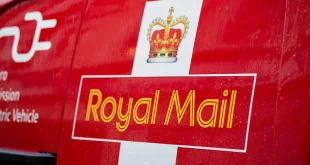The cost of tracked parcel deliveries could fall by up to a fifth under a shake-up of services being considered by the postal regulator.
Royal Mail wants to bring tracked and end-of-day special delivery services into its tightly regulated operations in a move that would exempt them from VAT charged at 20 per cent. And with an increasing number of parcels being stolen from doorsteps, it would hand every household in the country access to more secure deliveries.
The plan is part of a submission by Royal Mail to industry regulator Ofcom, which launched a consultation earlier this year on the way in which letters and parcels are delivered.
Ofcom will set out proposals next month to change the universal service obligation (USO) — strict rules to which Royal Mail must adhere or face multimillion-pound fines. Traditionally, the regulations have focused on ensuring that Royal Mail delivers, VAT-free, first and second-class letters to every house in the country six days a week.
Royal Mail, whose parent company IDS is in the middle of a proposed £3.6 billion takeover by Czech billionaire investor Daniel Kretinsky, wants Ofcom to water down letter services, with second-class mail deliveries switched to three days a week.
However, it is keen to extend regulation in the area of tracked parcels on the basis that this could help grow its business as letter volumes decline. Because Royal Mail is already committed to delivering to every household in the country, the incremental cost to the company of carrying additional parcels is lower and therefore boosts profitability.
“Parcel tracking is [the minimum] that customers increasingly want and need and that is offered by competitors as a standard service,” Royal Mail said in its submission to Ofcom.
Because they are not under the universal service obligation, rival services typically charge extra to deliver to large parts of the country. “Surcharging by other parcel operators means that the market does not provide a fair solution that addresses the needs of customers in rural and remote areas of the UK,” Royal Mail said.
Royal Mail claims that because rival services are not governed by the USO, they charge more to deliver to large parts of the country, including rural areas
ALAMY
The company added that it was vital “all consumers and SMEs [small and medium-sized enterprises] have access to an affordable, one-price-goes-anywhere, fully tracked parcel service”.
Regulating tracked and end-of-day special delivery services would hand Royal Mail a commercial advantage over its competitors, however. Rivals would still need to charge VAT on their services, meaning that Royal Mail could undercut them.
Nevertheless, Royal Mail insisted that this was not the case. “There is no evidence to suggest that this would materially undermine competition in the market,” the company said.
Announcing its consultation in January, Dame Melanie Dawes, Ofcom’s chief executive, said: “We’re sending half as many letters as we did in 2011, and receiving many more parcels. The universal service hasn’t changed since then — it’s getting out of date and will become unsustainable if we don’t take action.”
Having been hit by the biggest campaign of industrial action in a generation, Royal Mail has missed legal targets on delivery under the USO. Ofcom said on Friday that only 79.1 per cent of first-class mail had been delivered on time — well below the 93 per cent target. The company did meet minimum standards on second-class mail, however.
Source link


